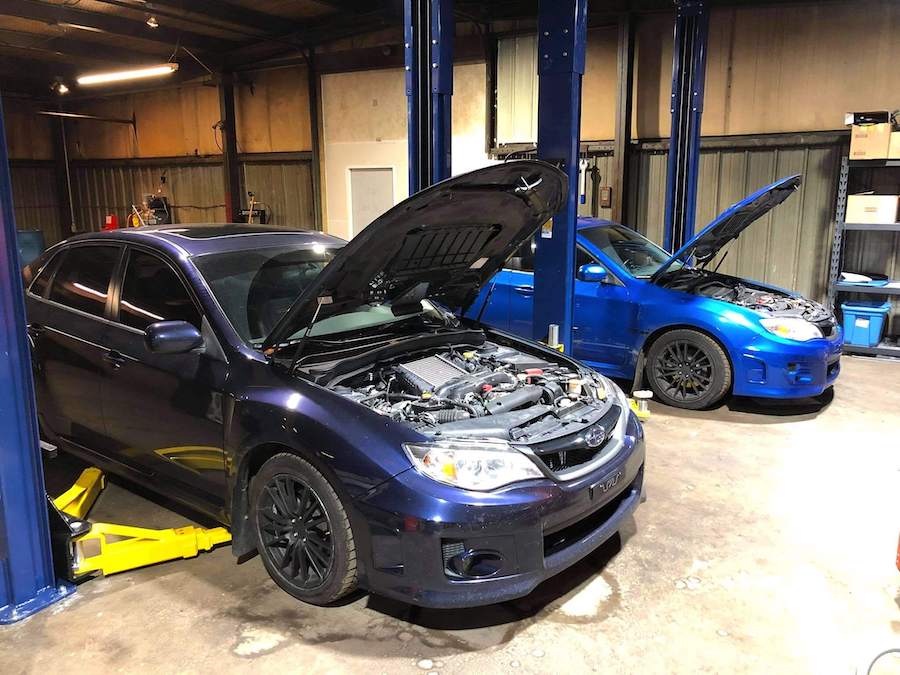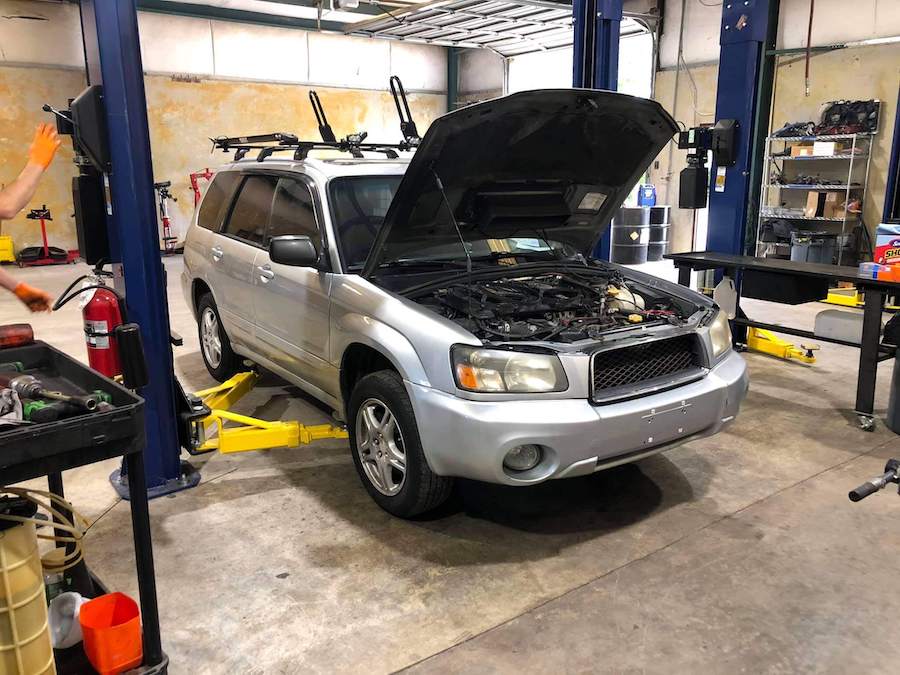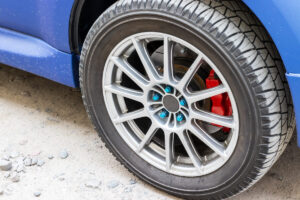Just like your body requires regular check-ups from your physician, your car also needs regular tune-ups from a mechanic. However, while it’s easy to know when to go to the doctor for a general check-up – most doctors suggest once a year – figuring out when to visit a mechanic to give your car a tune-up can pose a bigger challenge.
You should get a tune-up every 10,000-12,000 miles (16,093-19,312 km) or every year if you have an older car without an electric ignition. If your vehicle has an electronic ignition, check the manual – depending on the model, it’ll need a tune-up every 25,000-100,000 (40,233-160,934 km) miles.
The rest of this article will let you know how to tell if your car needs a tune-up, what a tune-up includes, and how much you can expect a tune-up to cost.

How To Tell If Your Car Need A Tune-Up
While the mileage lets you know when it’s time to take your car into the garage for a regular tune-up, you may need to get your vehicle checked out in other cases as well. Some signs that your vehicle needs a tune-up include:
1. Stalling
If your car stalls once, there’s a chance that it could simply have been a fluke. However, repeated stalling is unlikely to be due to chance.
There are a number of reasons why a car can start stalling, including dirty parts in the fuel system and malfunctioning sensors. Luckily, most of these issues can be fixed easily with regular maintenance and little TLC.
2. Warning Light
If the “Check Engine” light – or any other warning light on the dashboard – turns on, it shouldn’t be ignored. It’s doing exactly what it’s meant to do: letting you know that there’s an issue with your car.
Depending on which light turns on, your car may be facing any number of issues. Some are relatively minor, while others are urgent, complex, and will need to be dealt with right away, which is why it’s essential to take your car in for a tune-up as soon as you notice a warning light has turned on.
3. Poor Gas Mileage / Increased Fuel Consumption
If you notice that your car is using much more fuel than it used to or is getting a poorer mileage than the owner’s manual notes it should get, there’s a good chance there’s a problem that needs to be addressed. Some of the causes of poor mileage include:
- Poor wheel alignment
- Issues with the emission system
- Misaligned wheels
- Underinflated tires
- Transmission malfunction
4. Reduced Braking Ability
Damaged brakes can be extremely dangerous – the last thing you want is to be driving down the highway only to discover your brakes don’t work. If you notice that your car is losing braking ability, it’s essential to bring it in for a tune-up as soon as you can.
These are only some of the signs that indicate that your car needs a tune-up. Other signs include:
- Hard to start the engine
- Dieseling
- Rough running engine
- Strange noises coming from your vehicle, especially knocking
- The steering wheel or the seat of the car vibrates excessively or shakes a lot
Essentially, you should treat your car like you do your body – if you notice any issue, it’s important to bring the vehicle to a mechanic as soon as possible. In the best-case scenario, there’s nothing wrong with your car. In the worst case, getting your vehicle to a professional quickly will reduce the risk of lengthy, expensive repairs.
What A Tune-Up Includes
If this is your first time owning a car, you may wonder what a vehicle tune-up consists of. What repairs your mechanic will need to conduct will depend on the vehicle’s status and the results of an inspection.
However, a tune-up can generally be divided into two sections: the inspection and the tune-up.
The Inspection
The inspection is exactly what it sounds like. It involves assessing your vehicle to determine what, if anything, is malfunctioning in your car.
It’s usually a mainly visual check and includes:
- A check of the fuel-system components in the engine. This will help the mechanic confirm that the fuel filter and fuel injector are clean and unclogged and the fuel pump is undamaged.
- A check of the spark plugs and their performance.
- Double-checking the air filters, the oil and coolant levels, the engine’s PCV valve, and the ignition timing.
For more modern cars, mechanics don’t always need to conduct a visual check. Because newer vehicles are made with microchips, computer processors, and sensors, a repair technician can simply run a diagnostics check on this equipment to determine the problem.
However, it’s essential to always remember that computers can fail. While there’s a risk that the computer may miss a significant problem with your car, doing a visual check of your own alongside the diagnostics check will reduce the chance of an error taking place on either side.
The Tune-Up
The actual tune-up process will largely depend on the results of the inspection. After all, if the engine is performing perfectly, there may be no need to give it a tune.
However, in general, there are some relatively common aspects to vehicle tune-up. These include:
- Cleaning or replacing your car’s filters. There are three main filters in your car – the fuel and air filters and the PCV valves – all of which help keep your engine clean. However, over time, they can get clogged. If they go unchecked, dirty and clogged filters can lead to fuel pump failure, increased oil pressure, and more.
- Replacing the spark plugs. The spark plugs play a crucial role in your car’s internal combustion engine. However, they wear out over time, as the metal is constantly subject to high temperature and pressure. Tune-ups usually involve checking the spark plugs themselves, as well as the associated wires, distributor caps, and rotors.
- Setting or adjusting the ignition timing.
- Cleaning the points and condenser.
- Checking the battery.
- Replacing other worn-out parts, such as the sensors.

How Much Does A Tune-Up Cost?
A general tune that only involves replacing the spark plugs will cost between $40 and $150. However, most tune-ups require significantly more work and will set you back between $200 and $800. Costs will increase if parts need to be replaced, as you’ll have to account for the cost of the parts.
In general, most tune-ups are charged based on a combination of the hourly labor rate (which ranges from $40 to $150, depending on the garage or mechanic you visit), as well as any parts that need to be replaced.
However, there are other factors that affect the cost of your car tune. This includes the age of your car – tune-ups for older models can cost as much as $500-$1,200 due to the additional complexity of the job and the higher costs of replacement parts for older cars.
Additionally, major tune-ups will cost more, as they are significantly more detailed than minor tune-ups. Major tune-ups are usually only performed every 50,000-100,000 miles (80,467-160,934 km), depending on the type of car and engine you own.
How Much Does A BMW Tune Up Cost?
BMW owners should get a minor tune-up for their car every 10,000 miles.
You can expect to pay between $150-$400 for a minor tune-up for your BMW. A major tune-up is more expensive and can cost between $1,000 and $3,000. When averaged out, you will pay $1,000-$1,700 for yearly maintenance.
How Much Does A Subaru Tune Up Cost?
A minor tune-up for your Subaru will generally cost you between $150-$450. Major tune-ups are slightly more expensive and will cost between $550 and $700.
Subaru has a recommended maintenance schedule that you can refer to if you’re wondering when you should take your car in for a tune-up. This schedule involves tune-ups every 10,000 miles (16,093 km) or every six months.
However, depending on the condition of your car and how often (and how far) you drive it, you can also opt for a different maintenance schedule. I do recommend getting a yearly check, at least, to ensure that there are no issues you’ve overlooked.
Final Thoughts
Schedule your car for a tune-up at least once a year or every 10,000 miles (16,093 km). However, depending on the condition of your car and how frequently you drive it, you may need to schedule more tune-ups.
A tune-up will generally involve replacing the filters and spark plugs in your car and additional servicing if necessary. It’s essential to ensure your vehicle gets regular tune-ups, as they allow mechanics to catch any issues your car may be facing.
If these problems are left unchecked, you can be looking at expensive repairs or even being forced to replace your vehicle altogether.



